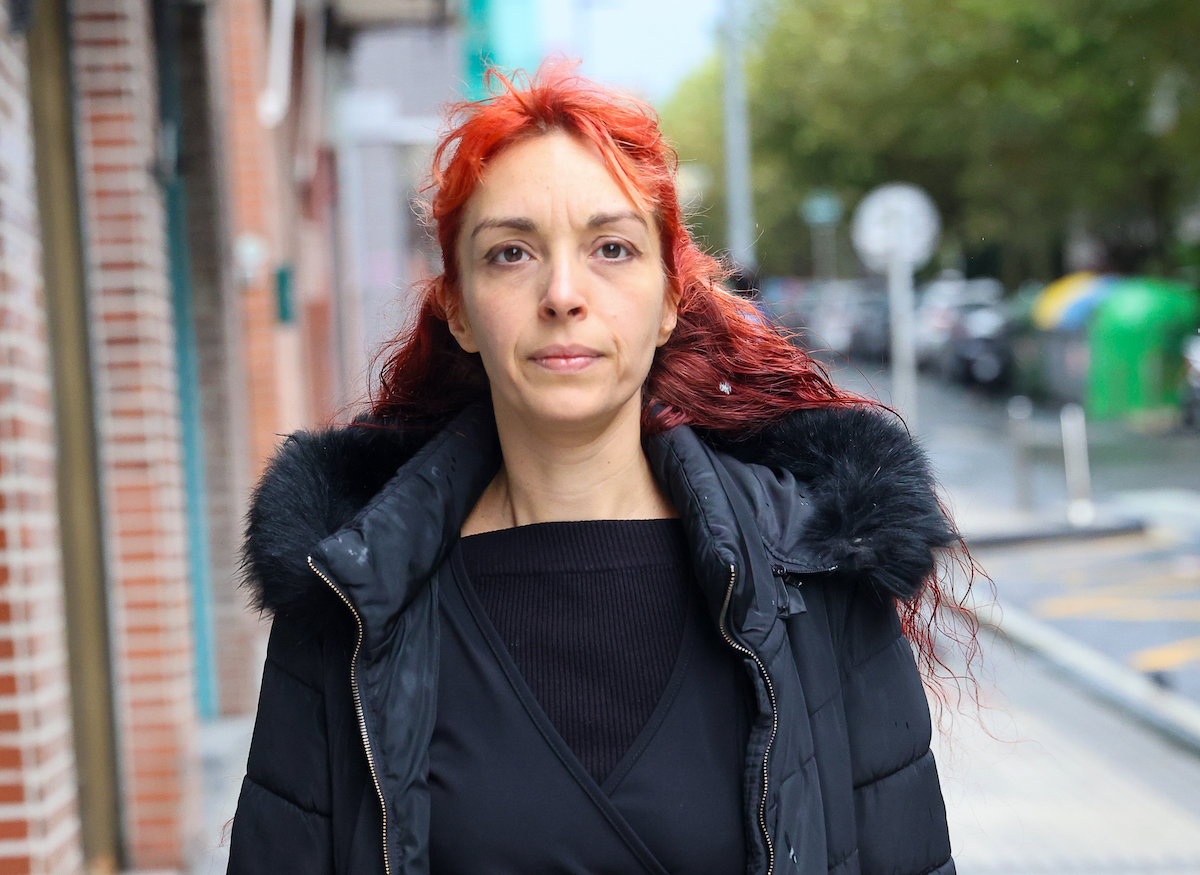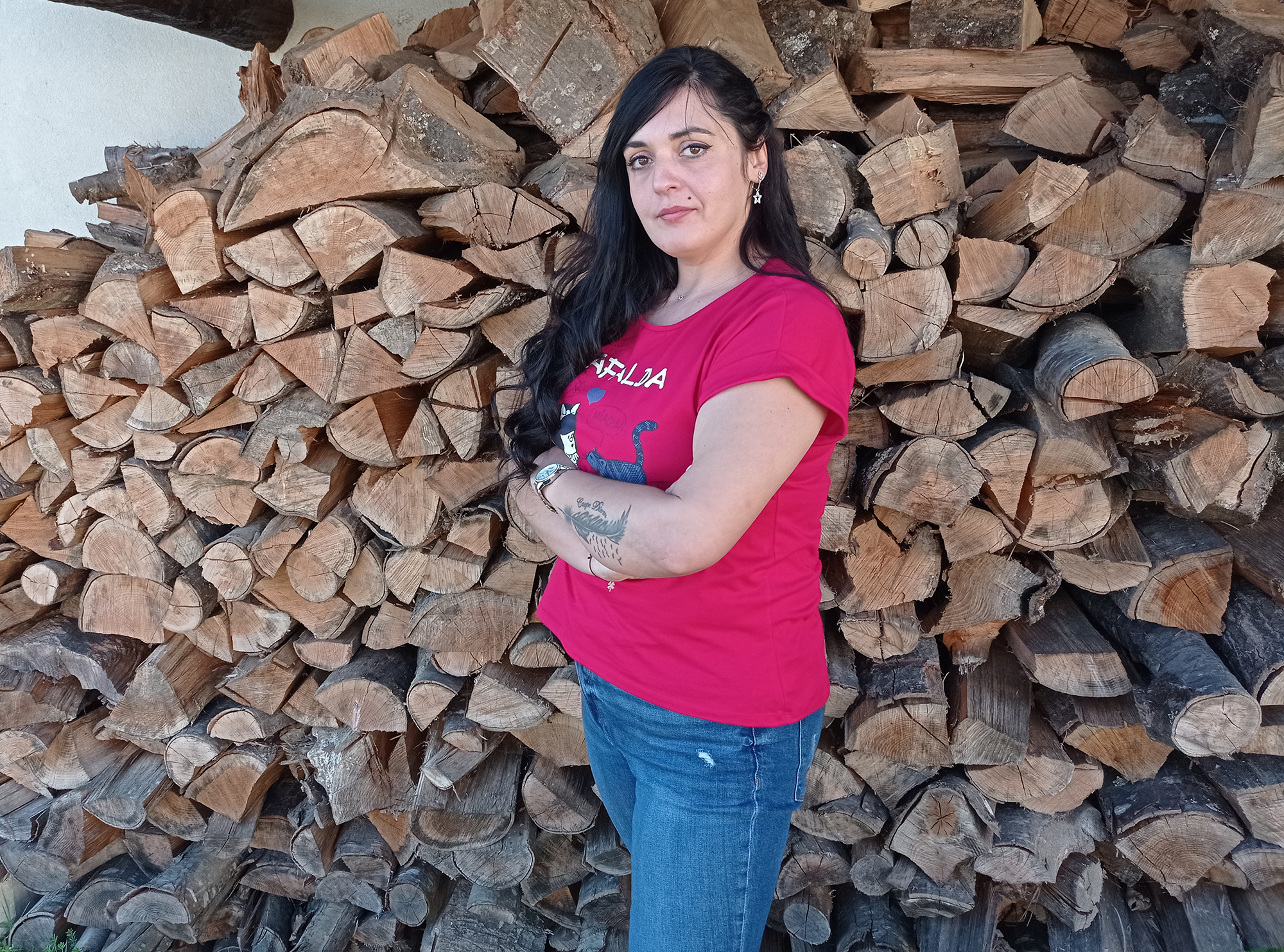"The Slut stigma is a control device for all women"
- Carolina Clemente (Barcelona, 1985) lives inseparable from existence. She is a sex worker and three years ago she came to work and live in Donostia: “I like the strength of the Basques to organize and protest. My stigma has been a source of inspiration for fighting.” In addition to being a sex worker, Putxs in Lucha is a collective activist, and is now also engaged in organizing the general feminist strike.

Some say it is the ‘oldest trade in the world’, but the reality is that it is also a source of controversy and debate. The last ones in Euskal Herria, attack the book ‘Puta Zikinak’ by the editorial Katakrak and ask that in the Women’s House of San Sebastian talks about sex be prohibited. Clement offers global readings going to the roots of the problem: the heteropatrial capitalist system.
Prostitution remains a great debate and taboo. Why?
By the way society is structured: marriage and family are the basis of a heteropatriarchal society, and we are the piece that contradicts that order. Being unfaithful and having a good woman are two sides of the same coin, with the difference that we are constantly discriminated against. It would be a good and bad model of heteropatriarchy.
But we are also the reason for maintaining that order. Honestly, married people stop having sex at one point; if family stability is maintained, there is often a getaway. Prostitution plays an important social role in the heteropatriarchal order.
Is there double standards?
Yes, of course. We have to punish ourselves socially so that women do not have to follow our model. They must contribute to the social order, be housewives and good mothers. The family is built in the sense of property and there is control over sexuality.
Katakrak’s book ‘Puta Zikinak’ was attacked in Baiona. Why so many problems?
On the one hand, one has to challenge the heteropatriarchal order; and on the other, within feminism, many women identify prostitution with the violence they have lived or can live. All women live under the threat of rape and think that when we are protecting the rights of the people who carry out sex work we are promoting their violence. What abolitionists do is hold us accountable for the bad practices of men. In the attempt to hold us accountable, they blame men.

What is the situation with regard to the exploitation of sex workers?
Firstly, let us ask, what is exploitation? Against will or with abusive working conditions? It has to be differentiated. Those who are in a state of treatment or trafficking are in a criminal situation — often he or his family is threatened, in their country of origin — and those who have poor working conditions are economically constrained because we live in capitalism, but they do not have that variable of threat.
These are two different situations which, if a solution is to be found, must be approached differently. If the sale is to be abolished, among other things, the Aliens Act must be amended. If labour exploitation is to be abolished, other measures must be taken.
When the issue is discussed, it seems that all women are in a position of buying and selling.
There are very few investigations that have come to the bottom of the problem. The United Nations carried out the largest investigation in 2000 and recorded those in a position of sale. Aware that he was counting from below, he multiplied by twenty and concluded that in Europe there were about 15% of people in a position to buy and sell. According to Carmen Meneses' last study published by Emakunde, CAPV does not reach 15%.
In any case, the question is why effective measures are not taken to deal with these cases. Where is the police, why not identify these situations? Why are NGOs that receive a lot of state money not getting there properly?
So why not take effective action? Trafficking is used to create discourse, create moral and demagogic terror, create visceral emotions around prostitution, but there is no real solution.
The solution is fully linked to the Aliens Act.
The Aliens Act requires a woman in a situation of trafficking, if she wants to stay in Europe, to denounce the person who helped cross the borders and not the exploited person. He has three months to think, for example in Sweden they are deported live. In short, everything is a matter of foreign control.
What is the state of working conditions and what can be done?
The situations that we report are many and very different, for example in clubs: they are not meeting the schedule, you can be working from five in the afternoon to seven in the morning; in some spaces they force you to be with some clients, which would not do if the worker had the opportunity, it forces practices and sometimes the consumption of toxic substances. We need a law for workers to have more freedom of choice. Of course, it is not absolute freedom, we live in capitalism, but no one is forced to meet certain conditions.
On the other hand, the job alternatives offered are not feminized and precarious. Many times women leave the street and put them to sew in return for miserable wages. The NGO APRAMP ‘rescued’ a Senegalese woman and had to convince her family not to help her anymore.
"People don't end because they have a trauma in prostitution, but
because of socioeconomic factors."
It talks about 'stigma whore'. What is that?
The Slut stigma is a control device for all women to control our sexuality. All women are socially accepted or rejected according to our sexual attitude, and worse, in harder cases, your rape will be justified because your behavior was right. Nerea Barjola explained the fear of women in the case of Alcassar, making them responsible for the situation. If you do something outside the norm, you can be punished and raped.
You denounce that there is a speech that says that sex workers are ‘traumatised’ or ‘dissociated’, because otherwise they would not do this work.
It is a constructed discourse and the class is a discourse without consciousness. People do not end up having a trauma in prostitution, but because of socioeconomic factors. And on the contrary, people who suffer trauma don't necessarily end up in prostitution, but they depend on the instruments that that person has.
In addition, it is an unknown discourse in relation to mental health and psychopathologies, since with some symptoms one cannot work sexually, it is very difficult because it needs high control over the body, you need a great self-discipline to be a laborer sex.
Should we talk about freedom to do sex work?
Rather than freedom of choice, we have to talk about legitimacy. Through disability, legitimacy is taken away from us and at the same time a great deal of damage is done to us. They tell us: ‘You are not able to make decisions’. One thing is that one person suffers a trauma and the other completely loses his life. They continually revictimize us, for what purpose? With the aim of better control.
Imagine someone who has been raped. They say, "You are not the owner of your body, until I repeat it. Until he hugs the heteronoromative order again." What seems to me is that they do not want dissidents from the productive and reproductive system.
What is the situation of street sex workers like?
Street workers have been suffering for years from municipal ordinances and Moorish law. In Donostia-San Sebastian, street prostitution is very scarce, so municipal ordinances do not have much influence, as in Irun something else. These laws precarize the situation of sex workers. Most have moved elsewhere and those left are the worst. Customers then believe they have more rights and ask them more for less. More self-exploiting and more unwanted practices must be done. These laws only harm sex workers. What is the solution? What they demand: to work spaces that are neither disturbed nor disturbed.

Can you explain the situation in Donostia?
In San Sebastian there are several clubs and something else in the province. Lately I'm going a long way to expand the information of the feminist strike. Two in Tolosa, three in Irun… In Donostia, above all, are rooms that are rented independently. Of course, those who have the prices bulging.
When I worked here, I paid 250-280 euros for one room, every week. No contract, of course, with the risk of staying in the street at any time. These are usually three- or four-bedroom houses in which several people circulate. We launch our launches and get our customers.
Only yes, the law has changed the rules on advertising, and launches on prostitution pages are now being banned. In other words, independent sex work is being banned. Women must return to clubs, to places with a client portfolio and accept their conditions. When you work for third parties, your vulnerability situation is higher and you have to do whatever you don't want.
He had to go from Donostia.
I was afraid the neighbors would report me, and two years ago I paid a flat in San Sebastian, which I'm often not there, because I'm going to work outside. I'm going to other European cities, Switzerland and Belgium. I, as I am from here, have the legal opportunity to go outside, but my colleagues are not, because the majorities are migrants in an irregular situation. All these laws are only making work precarious.
What problems have you had with your neighbors?
In Barcelona we were once thrown from the floor where we worked. The police appeared and we were kicked out from day to day. For the two workers we were from Barcelona there were not so many problems, but for our colleague from Venezuela it was a big problem, because he lived there.
This has not happened to me, but the fear of losing the house is enormous. If living in San Sebastian is almost impossible, for us we have nothing to say, we have no payroll… For us it is very difficult to rent a house.
What's your story, how did you start working?
Initially it was for a short time, with a specific objective. I was doing precarious work, in a student age, in Cáceres, and I wanted to go outside. I've been with psychological concerns for years, for different situations I suffered. I wanted to go to Paris, finish the French philology career, and in my family there were no means, and I also had to help in other responsibilities.
I started working in prostitution in July desperately. That same month I was admitted to a psychiatric hospital. What happened in the mental health system over the coming months and years affected me a lot. In the different therapies I was very stigmatized, as if the basis of everything was prostitution. His goal was re-education, I got into a heteronormative order. As if it were a victim who had not been able to make any choice, as if it had no free will. I wasn't a person.
How did he face it?
This situation changed my symptoms and I had to choose: either I didn't become a person and end up depersonalized all my life, or I fought stigma so no one had more power over me. At 28, I decided to go back to prostitution to fight that stigma.
I studied psychology and thought to help other sex workers as a therapist. I had to find a way to do a sex job that doesn't cause discomfort.
On the other hand, honestly, I have no intention of dedicating eight hours a day in a space that gives me nothing, where there is a person who mistreates you. For me, the most common thing in the workplace is that you have a person above you and you get mistreated. I don't want that.
How do you experience this stigma?
It is a great conditioning factor. Condition your relationships because it is always in the eyes of the other. And on the other hand, institutional violence. Many of the members have been taken away from their children, because one of the arguments is that they are now or in the past a sex worker. This totally shapes my life. We have great discrimination in the health or judicial system, everything seems to be related to working sex. Sexual morality is fully involved in society.
You're a Putxs collective activist in Struggle.
It was an empowerment, of course. It was also hard for me because I didn't turn back. My whole environment knows I'm a sex worker, but the public union of my face will close me many doors. In the workplace, in the future, I don't know.
On the other hand, I was very aware that the violence suffered by sex workers went far beyond what I lived: deportation, police violence, institutional violence, jail… and all of this for doing whatever you want with your body. Prostitution is not always nice, I do not hesitate, but from there to justify someone being in jail… it has no logic. That anger fueled me.
You mentioned that you are organizing a feminist strike. What are your demands?
If there were not so much exploitation in feminized jobs, there would be less need for prostitution. In order for there to be fewer forced sex workers, the first thing to do is to improve working women's working conditions. We will demand that the issues affecting our working conditions be resolved: Aliens Act, right to housing… We are still in the organizational phase. Organization is hard at any job, think about us. Because ours is a collective that feels totally marginalized. To the extent that prostitution is not recognized as work, it is difficult to develop worker solidarity.
According to the latest study by Emakunde, between 1,968 and 2,308 women were working in prostitution at the CAPV in 2018. ‘Trafficking in women and girls for sexual exploitation in the Basque Country: needs and proposals’ is a report published in 2021 that states that between 10 and 15% are victims of trafficking. According to the police and counts of several NGOs. All victims of trafficking detected and identified in the CAPV are foreign, as in the Spanish State, and are in an irregular situation. Women came from Latin American countries, Asia, Africa and Eastern Europe, were between 18 and 35 years old and most were mothers.
Katakrak argitaletxearen Puta zikinak liburuaren kontra oldartu da CAPP Collectif Abolition Porno Prostitution kolektibo feminista Baionan, Elkar liburudendan. Juno Mac eta Molly Smith idatzi liburuaren azalak urratu eta "Prostituzioa: bezeroak, bortxatzaile... [+]
Sexu-lanaren gaineko eztabaida pil-pilean dago berriro ere mugimendu feministaren barruan. Batzuek iritzi argiak dauzkate, beste batzuek ez dakite oso ondo nola kokatu. Lynzi Armstrong ikertzailea Donostian izan zen azaroan bere azken liburua aurkezten, eta haren azalpenak... [+]
The latest report on prostitution in the Basque Country published by Emakunde once again focuses on women and disregards the role of entrepreneurs who move the business. The report "Trafficking in women and girls for the purpose of sexual exploitation in the Basque Country: needs... [+]
In Madrid, in the Spanish Parliament, the intention was applauded to make a law that equates homeworkers with other workers. The workers there said they applauded for the years struggle. The decision is a compromise for the moment that must go a long way towards becoming law... [+]





















